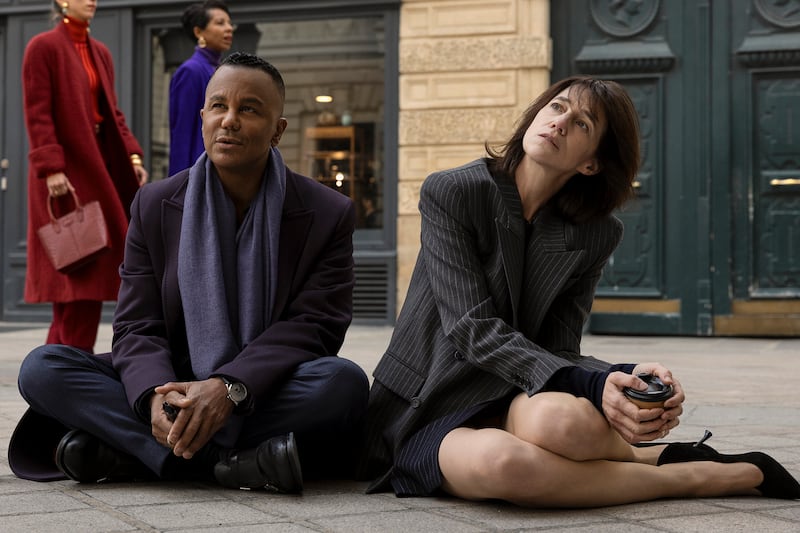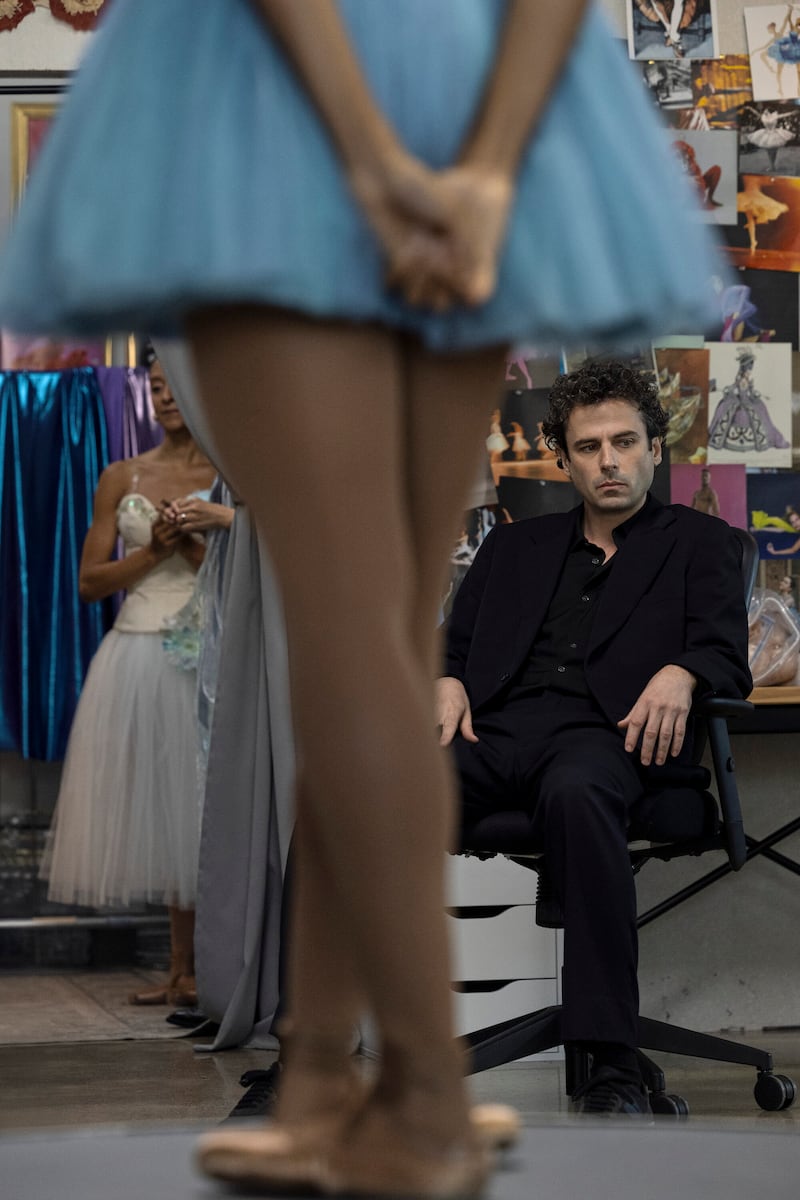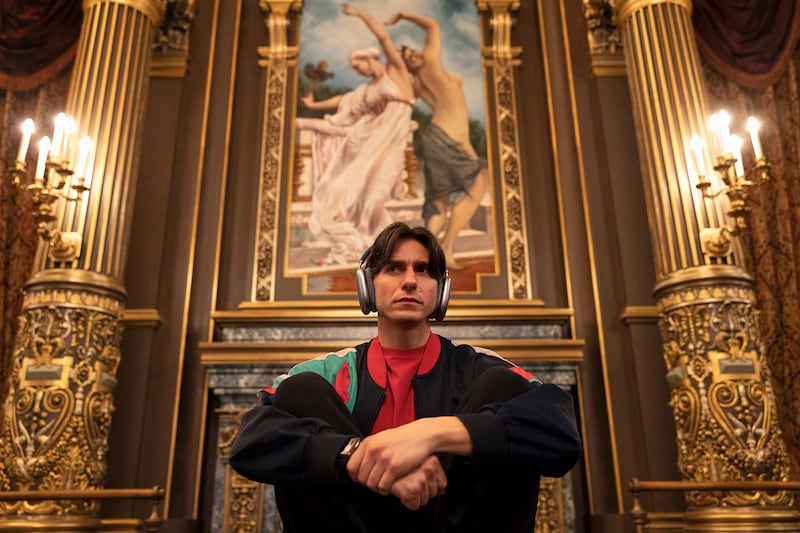Ever since Gilmore Girls, writer/director/showrunner Amy Sherman-Palladino has become synonymous with a certain kind of cozy, girly escapism. That was initially the draw of her stylish period comedy The Marvelous Mrs. Maisel, too. But as anyone who stuck with Midge Maisel’s compelling antiheroine arc knows, Sherman-Palladino is a much thornier, more complicated storyteller than she’s given credit for.
That impulse to blend soft, feminine whimsy with ice-blooded intensity has never been clearer than in her new Prime Video series, Étoile—her most sprawling, least accessible, but perhaps most personal TV project yet.
Set in the world of professional ballet, Étoile, which premieres April 24, follows two world renowned dance companies as they decide to spice up their seasons by “swapping” their top talent for a year.
Over in Paris, chic hot mess Geneviève Lavigne (Charlotte Gainsbourg) welcomes eccentric American choreographer Tobias Bell (Gideon Glick) and a few rising dancers to Le Ballet National, where she’s the interim general director. Meanwhile, hot-tempered prima ballerina Cheyenne Toussaint (Lou de Laâge) is shipped off to New York City’s Metropolitan Ballet Theater, where the “étoile” (the French word for star) soon finds herself butting heads with neurotic executive director Jack McMillan (Maisel breakout Luke Kirby).
The eight-episode series hops between the two locations and throws in about a dozen more cast members to capture an ambitious, if unfocused, portrait of life in the ballet. Fans of Sherman-Palladino and her husband/long-time creative partner Daniel Palladino will be thrilled to find all the duo’s creative signatures here: rapid-fire dialogue, sarcastic humor, endless pop culture references, eccentric supporting characters, gorgeous long-take filmmaking, and a guest role for Kelly Bishop.
But what’s new is the comedic tone. The last time the Palladinos tackled ballet, they made Bunheads, an earnest, quirky smalltown show about the power of dance inspiring multiple generations. This time around they’ve made an acerbic, urban series about how the business of making art just might destroy you—but maybe it’s worth it anyway.

That spirit is best embodied in the character of Cheyenne, who feels like the culmination of decades of debates about whether the Palladinos’ female heroines are supposed to be “likable.” Surly, snarling, and unapologetically blunt, Cheyenne brings a fiery intensity to her scenes, whether she’s selecting a ballet partner or performing a pirouette. Despite being the most lauded ballerina in the world, she seems to have a misanthropic hatred of life itself. Yet, she knows her talent is so great, it would be a sin not to share it.
It’s an explosive, unforgettable performance from de Laâge, although, surprisingly, Étoile isn’t primarily rooted in a dancers’ point of view. Though the show shares the same Lincoln Center filming location as the ballet classic Center Stage and features beautiful extended sequences of rehearsals and performances (largely danced by the cast themselves), it’s even more interested in the business logistics of how a classical artform survives in the modern age.
In France, Geneviève must navigate the governmental bureaucracy of state-sponsored art and an ensemble of dancers who are perpetually threatening to go on strike. In New York, meanwhile, Jack has to gladhand donors and ensure the annual cash-cow production of The Nutcracker goes off without a hitch.
Both struggle with the egos, eccentricities, and romantic entanglements of their artists, not to mention an idiosyncratic billionaire named Crispin Shamblee (Simon Callow) who funds the swap as a sort of karmic balance for his war profiteering and chemical manufacturing. (An odd throughline that perhaps gives the Palladinos a chance to vent about how weird it is to make art for Amazon.)

There’s a bit of shared DNA with one of Prime Video’s early hits, the classical music comedy Mozart in the Jungle. But Étoile more calls to mind the show that first put Kirby on the map: the Canadian cult hit Slings & Arrows, which brought a similarly wry comedic tone to the logistics of putting on an annual Shakespeare festival. There, Kirby played the hotshot young talent. Now, he effortlessly steps into the role of beleaguered manager—combining his gift for snappy dialogue with some sheepish 1980s-era Billy Crystal charisma.
It’s a fantastic evolution of his work in the Palladino-verse, and he’s well-matched by Gainsbourg, who somehow manages to be both hilariously frazzled and impossibly cool all at once. The trouble is, the very premise of the show means the two ballet execs spend more time apart than together.
Without a central anchoring relationship like Susie and Midge in Maisel or Lorelai and Rory in Gilmore Girls, the transatlantic series often becomes too sprawling for its own good. The New York half smartly pairs Jack and Cheyenne as another sparky duo (Kirby and de Laâge are incredible together), but the Paris half lacks any real sense of focus—often devolving into the kind of whimsical asides that could be so draining on Maisel.

To its credit, the show finds a better balance as it goes along. A seemingly aimless throughline about a promising young dancer named Mishi (Taïs Vinolo) suddenly finds great poignancy in the show’s sixth episode. The overexaggerated quirks of Tobias’ artistic process get an electric romantic charge when he’s paired with a cocky corps dancer named Gabin (Ivan du Pontavice).
And in a show full of prickly characters, David Haig turns in a minor miracle of a performance as MBT’s lovable, well-lived artistic director. It just seems like a series this short yet ambitious should be tighter and more focused. (Though Étoile was originally picked up for a two-season order, its future now seems a little less certain.)
Still, even if it sometimes feels like the Palladinos are building the plane as they fly it, it’s also thrilling to watch them operate without guardrails—throwing out conventional narrative rules and expected comedic sensibilities to follow their own oddball passions instead. One episode devotes a full 20 minutes to an elaborate dance showcase; another throws all realism out the window to turn the process of making art into art itself.
If Gilmore Girls and Maisel were the Palladinos trying to make shows with mass appeal, Étoile feels like a show they’re making for themselves. It’s a fittingly insular take on a niche artform. But those who can get on its wavelength will be well-rewarded with a funny, passionate celebration of both ballet and the weirdos who make it.
The post ‘Étoile’: ‘Gilmore Girls’ Creators’ New Ballet Series Twirls With Surprising Humor appeared first on The Daily Beast.




